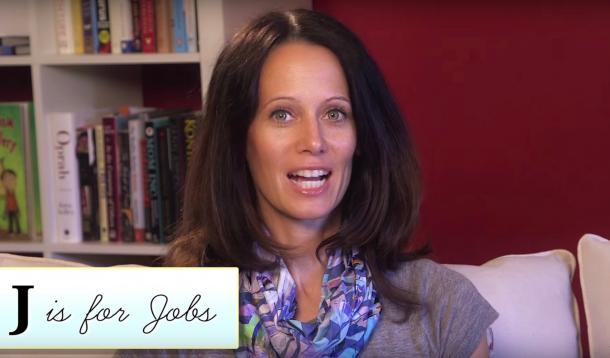
Hi! Welcome back to the A to Z of Taming Tantrums video series. This week I'll be discussing the letter J, and J is for Jobs.
"Jobs" is the word I like to use instead of "chores." These are the daily tasks that everyone in the household needs to do in order to keep things running smoothly. Getting our young children used to, and involved in daily jobs will help making cleaning up become a regular part of life.
In this week's video, I explain how you can use the concept of jobs to reduce tantrums when it's time to chip in. I also share my favourite phrase for reminding children how to put their things away. Please click on the image below to watch the video:
Do you have a trick for getting your children to help out around the house? We like to put two or three fun songs on so we can dance our way through the jobs. Having only a few songs at a time helps make those jobs not feel too overwhelming or tedious. I also get our kids to clean up as the day progresses rather than leaving a lot to do at the end of the day when everyone is tired.
Thank you for continuing to watch this series, and I encourage you to come back for the next one which is the letter K, and K is for OK. Can you guess how OK is linked with tantrums?
We're so excited to share with you the A to Z of Taming Tantrums video series!
Each week we'll share the next letter of the alphabet and Andrea will discuss how it relates to reducing tantrums - and improve our experience as parents! You can view each video here as they are added each Friday.


A report by the Office For National Statistics in the UK released this week indicates that people aged 40 to 59 have the lowest levels of life satisfaction and happiness, and the highest levels of anxiety. The report analyzed data provided by 300,000 British citizens raging in age from 16 to over 90 (their income, sex, and race data was not provided).
As I read through the report, my first reaction was, I’m not surprised. As someone right in the middle of that unhappy, anxious age-range, it feels quite possible that these numbers represent the reality for many “middle-aged” people like me (that was painful to write!).
The report goes on to state that people between the ages of 16 and 19 and also between 65 and 79 have the highest average ratings of life satisfaction, and worth, “worthwhile” and happiness. Adults aged 45 to 54 had the lowest levels in these categories.
Here's a graphic of their results:

What makes this time of life so challenging?
I am 45 years-old with six and eight year-old boys. I gave birth to my youngest son only two months before my fortieth birthday. I certainly find it hard to be happy while managing the tantrums and development of my young children. I was just invited out for an evening with a friend in the “big city” last night and decided to leave early for the sake of a good sleep in my own bed.
This middle age demographic has a few unique challenges that the happy seniors do not: research shows we are having children later so many like me still have young children in the house. At the same time, we also have parents in their seventies to nineties to take care of, but often live further away from them and other extended family members. We have mortgages to pay, are in the height of our careers, and living with the experience of social media and smartphones. We are always on, tired, and trying to keep going.
It appears to me that people between 40 and 54 are trying to be super-adults. We want to have extravagant vacations, exciting careers, and look fabulous while doing this. Has social media done this to us? It appears that keeping up with the Jones’ has been magnified when everyone’s watching on Facebook. I think this truly is a factor driving our anxiety: our personal challenges, like a child not making it into the college of their choice, are now on display for all to see.
We know that low levels of happiness stem from a lack of internal contentment. We are trying to fill that void with external validation, material things, and constant activities, which we expect to invigorate us. Maybe we should rather make time to regroup, recharge, rest, and ponder, instead of hitting the gym, trying super-foods and using odd treatments to give us energy. We’re spending time and money trying to feel happier when what we really require is the space to rest, and time to fulfill our true internal needs, given our heavy burden of responsibilities of earning enough money, raising children and taking care of our parents.
My mom spent one evening a week at “stitch and bitch” with her girlfriends, another at curling, and one at choir. She had a tribe of women around her who got together regularly away from our house, my dad, and us. There were no smartphones on, no emails being returned, and no texts being sent in the evenings. When she wasn’t out with the girls, she was on the sofa after her full workday and taking care of us with crocheting in her hands, Dad on his “chair,” and Cheers on the television. That maybe wouldn’t look great on Facebook but it sounds pretty appealing to me!
A high sense of worth and happiness is an internal feeling that, regardless of our external circumstances, helps us feel content with where we are and with what we have. It’s about not feeling the need to constantly do more and have more. Maybe it’s time to stop trying to keep up and time to pick up the knitting needles, as stated in this New York Times piece. This study should be a wake up call for us slow down and ask why we do all that we do, and do these things help us feel truly content, worthwhile and happy. And if not, why not?!
I'd like to know: do you feel happy? If not, what do you think is stopping you from feeling joy and happiness? I'd love to hear your comments here or over on my Facebook page. (The picture above is of me this week on the occasion of my first day downhill skiing without my little boys.)